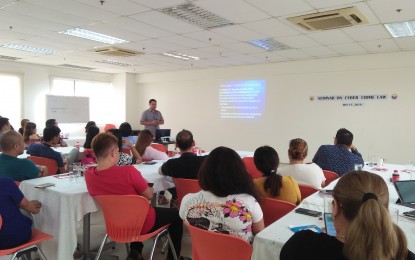
CYBERCRIME LAW SEMINAR. National Bureau of Investigation Special Investigator Rojun V. Hosillos discusses some of the salient points of Republic Act 10175 or the Cyber Crime Law before selected employees of the Iloilo City Hall on Friday (May 17, 2019). The NBI cited that local government units can help prevent cybercrime through the conduct of monitoring and information dissemination. (PNA photo by Perla Lena)
ILOILO CITY -- Local government units (LGUs) are in the position to help prevent cybercrime, particularly in monitoring of suspicious activities and conduct of information drive.
In an interview Friday, Lawyer Christopher M. Hernandez, supervising agent of the National Bureau of Investigation (NBI) in Western Visayas, said local government units know the people in their locality.
Residents may report foreign-looking groups staying in one house with fast Internet connection and who seldom go out.
“There’s nothing wrong about investigating. If they are doing something not illegal then so be it, they can participate in every business here,” he said.
Also, the LGU can embark on information dissemination especially that the usual victims of cybercrime are minors.
Hernandez said that in his almost six years with the cybercrime division of the NBI, most of their clients are minors engage in online sex or uploading nude photos.
“There is a need to empower families regarding internet discipline; the discipline on how to use internet,” he emphasized.
A team from the NBI served as resource persons on the “Seminar on Cybercrime Law” facilitated by the Human Resource and Development Office of Iloilo City.
“If you commit a crime using an internet or information technology that’s cybercrime,” he said.
During the seminar, the more than 30 selected city hall employees were briefed about the salient points of Republic Act 10175 or the Cybercrime Prevention Act of 2012; common modus operandi; common crimes committed through the internet, particularly social media and scams.
“We would like to conduct proactive cyber security lecture to help them how to protect their accounts, how to avoid being victimized by scams and how to avoid being victimized by cyber criminals,” he said.
In the Philippines, the most common kinds of cybercrimes are libel using Facebook; anti-photo and video voyeurism and scams.
He warned that criminals conduct social engineering where they investigate the profile of the person.
“Be careful on uploading your personal information on Facebook or over the internet because it can be used as a tool. Most of the time, ordinary internet users use password based on personal information,” he said.
He said that in case they need help, they can always approach the NBI or the cybercrime group of the Philippine National Police (PNP) because they are “equipped and competent to handle cases”.
Maria Xenia M. Serio, supervising administrative officer, said that the seminar was the proposed by City Administrator Lawyer Hernando Galvez.
She added that with the seminar, participants became knowledgeable that some of their actions using the social media could be penalized. On May 16, the same participants also learned about using the social media.
“This could really help them become vigilant and knowledgeable on what constitutes cybercrime so they can avoid it,” she said.
Hernandez was joined by NBI Special Investigator Rojun V. Hosillos and NBI consultant Rodel F. Plasabas during the afternoon session of the seminar.
The seminar was held at the Penthouse II of the Iloilo City Hall. (PNA)
